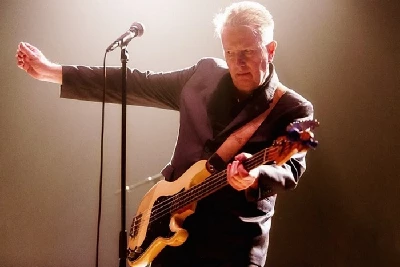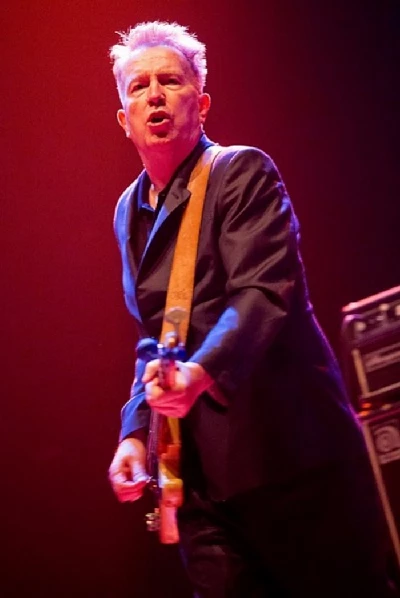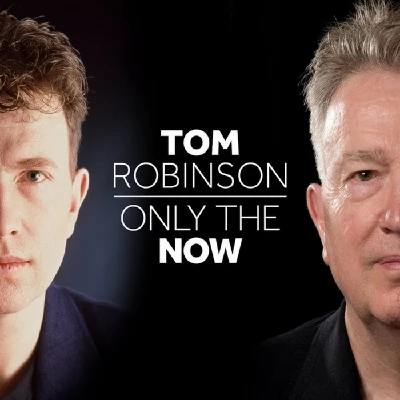published: 25 /
9 /
2015

John Clarkson speaks to 70's singer-songwriter and 6 Music DJ Tom Robinson about 'Only the Now', his first new album in almost twenty years
Article
One of the great protest singers and social commentators of the 1970s, Tom Robinson is best known for his 1978 song, ‘Glad to Be Gay’. Written originally for a London gay pride march, it appeared on his group the Tom Robinson Band’s EP ‘Rising Free’ and received an unofficial ban from the BBC, only being broadcast by John Peel. It is now considered to be Britain's leading gay anthem, and, a rallying call for tolerance of people regardless of their sexual orientation, did much to counter balance the "booze and birds" and homophobic culture and thinking of a lot of 70's society.
Tom Robinson has continued to update it over the years, adding to the original verses about police brutality, the media’s portrayal of the homosexual community and gay bashing with new lyrics about the AIDs crisis of the 1980s and what Robinson, who has since married and had children, has described as his “late onset bisexuality.” Even in this more enlightened and liberal era, it continues as a result to be as topical and as inspiring as ever.
The TRB’s s 1977 debut single ‘2-4-6-8 Motorway’, which was about Robinson's memories of driving back to his native London through the night after gigs with his earlier band Café Society, gave them an early hit, reaching no. 5 in the charts while ‘Rising Free’, despite the ban on ‘Glad to Be Gay’ peaked at no. 18. The group also had a more minor hit with ‘Up Against the Wall’, which written on the dawn of Thatcherism, was an early anti-austerity number, and touched the bottom end of the Top 40.
After the TRB split up in 1979 having recorded two albums, the much acclaimed ‘Power in the Darkness’ (1978) and ‘TRB Two’(1979), Tom Robinson went solo. He would go on to record six more albums, ‘North by Northwest’ (1982), ‘Hope and Glory’ (1984), ‘Still in Love with You’ (1986), ‘Living in a Boom Time’ (1992), ‘Love Over Rage’ (1994) and ‘Having It Both Ways’ (1996). He also a final Top 10 hit in 1983 with ‘War Baby’, which was in part about the barriers between East and West Germany.
With his musical career in decline, Tom Robinson began a new career on radio. Since its inception in 2002, Robinson has been a regular DJ on BBC 6 Music, his current shows being a three hour Saturday night slot and also an early hours Monday morning show called ‘Introducing …’, both upon which he specializes in playing new music.
Now, after a hiatus of almost twenty years, Tom Robinson is about to release a new album, ‘Only the Now’. Produced by Gerry Diver, it features guest appearances from Billy Bragg, John Grant, Martin Carthy, Lisa Knapp, former Adverts front man TV Smith and Mancurian singer Lee Forsyth Griffiths as well as actors Colin Firth and Sir Ian McKellen.
The album has been preceded by a download only single ‘Don’t Jump, Don’t Fall’, which tells of the suicide of a teenage runaway. All the proceeds from it are being given to CALM (the Campaign Against Living Miserably, a charity dedicated to preventing male suicide).
Tom Robinson will be playing dates across the UK in October and November for what he has billed as ‘The Mighty Sword of Justice’ tour. Pennyblackmusic spoke to him about ‘Only the Now’ and ‘the Mighty Sword of Justice’ shows.
PB: Your last album ‘Having Both Ways’ came out in 1996. Why has there been this absence of almost twenty years from recording music? Was it simply because your radio career took off?
TR: I ran out of steam as I came to my late 40s. I lost all my physical energy from touring all the time. I was having to go out on tour just to pay the mortgage, and it became dispiriting because people were only coming to the shows because of something that happened twenty years previously. It wears you down playing to fifty people at the Wheatsheaf pub on Stoke-on-Trent who talk all the way through the set (Laughs).
When the job came along at 6 Music which allowed me to get back my passion for music by talking about and sharing it with other people, it seemed like a really natural place to go.
PB: Why have you decided to come back now then at this particular moment in time?
TR: It is a conjunction of things. Firstly I have turned 65. Secondly my kids have grown up, and thirdly I met Gerry Diver who produced the new album. I think that Gerry is the most important catalyst because until I started working with him I had had all these songs sitting on a back burner that I had been writing but which I had done nothing with.
PB: So, had you actually carried on writing music during those twenty years away?
TR: Oh, yeah. I used to write songs long before people paid me money to do it. It's something I've never stopped doing.
PB: What do you think is the main thing that Gerry brought to ‘Only the Now’?
TR: He specialises in sound collage. The first thing that I heard of his was his ‘Speech Project’ album. He had undertaken interviews with a lot of traditional Irish musicians, and he had taken the melodies from their voices and reflected that into musical compositions that he then laid underneath them. He is very sensitive to words and to the human voice and adores creating sound in the studio. He sees production work as a creative tool like kind of painting with oil, and putting together layers and layers of sound.
So, I had been taken with that, and then I heard ‘Ground on Its Own’, Sam Lee’s album which was Mercury-nominated and I found out that that was produced by Gerry as well, and then I heard Lisa Knapp’s album ‘Hidden Seam’ which won Radio 2 Album of the Year and I found out that that was produced by him and that he was actually married to Lisa Knapp. Then I heard ‘Themesis’, the Mishaped Pearls’ album which was also produced by him. I ran into him at the English Folk Expo last year and I got talking to him, and he said, “If you ever think of making a record, do get in touch”, and I was like, “I thought that you would never ask” (Laughs).
Gerry didn’t make the kind of record that I expected him to make. It is nothing like I have ever made before either. He has never worked with a full drum kit before, and I have got Andy Treacey from Faithless on it.
PB: There are all these special guests on it. Many of them are musicians, but there are also the actors Colin Firth and Ian McKellen who you wouldn’t normally expect to see on an album like this.
TR: That again stems from Gerry’s fascination with the voice. He just wanted really distinctive voices as part of the sound palette that he worked with. TV Smith, for instance, has this wonderful ragged voice, and forty years of gigging has given great texture to it. Lee Forsyth Griffiths is on pretty much all of the tracks, and brings in this Mancurian soul approach with his vocals and also a rough, tough edge to it. Sir Ian’s voice is deep and rich and fruity, and Colin was the perfect newsreader when we needed a newsreader. I had done benefits with both of them over the years so I knew them and was able to ask them.
PB: Is there anything on this album that you are especially proud of?
TR: My favourite track on the album is probably ‘Merciful God’. It is just total sonic mayhem. We have got Gerry on violin, and it is like the sound of a civil servant being let loose with a wrecking ball (Laughs). Then there are these chainsaw drums from Andy Treacey and Andy Phillips with this insane guitar. It is wilder than anything that I have made before.
It was inspired by a CNN interview that I saw with a bomber pilot during the Iraq War, who said (Puts on an American accent), “I am a Christian. I believe that I am doing the job that God put me here for.” That resonated really strongly with me. Anybody who thinks that they are doing the job that God put them there for can justify anything, but I wanted to make the point that school of thought is not unique to the Islamic world.
PB: Was your recent single ‘Don’t Jump, Don’t Fall’ based upon a real incident?
TR: It was, and more importantly it was based on the fact that when I was a teenager I tried to kill myself as well. Having survived two suicide attempts myself, it is only when it happened to someone close to me and my family that I suddenly realised the full enormity of what I almost did to my own family. We put it out in support of CALM, and they are going to be using it for a soundtrack of a video which they are making.
PB: What do you think CALM offers that is not being done already by other suicide prevention charities like the Samaritans?
TR: I think that some young men would find it quite an alienating experience to talk to the Samaritans because of the kind of image that it has. CALM has a more accessible image to a certain demographic, and that demographic is highly at risk.
PB: It is particularly a male charity, isn’t it?
TR: It is. There is this astonishing statistic that suicide is the biggest cause of death for men between twenty and forty-five. That is mind boggling when you think of the traffic accidents and the cancer and the violence and the alcohol and all the other things that it could be. It is just shocking. I agree with Jane Powell who runs it that it is to do with that stiff upper lip attitude of the British. If you break your leg, you have no problem going to hospital, but if you are broken inside it is very hard to reach out for help. It is not within our culture, and men more than women don’t ask for help.
PB: You have put this album out through a PledgeMusic campaign. Why did you decide to do that rather than perhaps go through the regular channels of a record label?
TR: The regular channels weren’t open to me. The one thing that the world isn’t waiting for at this point is another Tom Robinson album. That train left many decades ago (Laughs), so there wasn’t the smallest chance of getting a record deal, so we turned to the people who wanted to hear it and said, “Would you like to buy it in advance?” and thankfully they said yes.
PB: How easy have you found it doing it that way?
TR: What you don’t appreciate until you get stuck into it is that you only see about 70p from each pound that is raised because of things like VAT. Immediately 20 percent comes off the top, and then a percentage goes to PledgeMusic themselves because they provide a very tailored service. I don’t grudge them that, but we should have made the original target a lot higher. We got 165% of the original target but even that wasn’t enough to make up the actual cost of making the record. Those seven months in the studio turned out to be expensive.
PB: So how do you plan to make that up?
TR: Well, thankfully it is sorted. BMG/Chrysalis have signed me for publishing. They have signed the the whole back catalogue, which means that all my old records will probably will come out again, including the 80’s and 90’s albums that have been long deleted.
PB: So when is that likely to be?
TR: I am not sure. As soon as I get a bit of brain space (Laughs) and we have got ‘Only the Now’ out there and promoted. I have got the rights anyway. We just need to get the mechanics sorted.
PB: You’re going out on tour. You’re calling the tour ‘The Mighty Sword of Justice’ tour, which is the name of one of the tracks on ‘Only the New’. Why have you decided to call it that?
TR: The song on the album features Colin Firth, Billy Bragg, Martin Carthy, Lisa Knapp and this steel pan player called Frank Rollock, who we met busking outside Brixton tube station . We tried to make it sound like one of those massive street protest marches in the 80s . Fans who bought the album came and sang on the chorus as well. It is the biggest rabble rousing song off the album, and so we decided to name the tour after that.
The other thing, of course, is that we are seeing the justice system being hacked to bits under our eyes at the moment. It is a good time to be drawing attention to the fact that legal aid is being withdrawn from about 80% of the people that previously had it, and that it costs us £700 to plead innocent while it only costs you £150 to plead guilty. It is scandalous.
PB: It seems that you have lost none of your political anger.
TR: This album is all to do with the now. The whole thing about this album is that I am 65 and all we have got now is the now. This is the youngest that I am ever going to be. This is the first day of the rest of my life, and the main theme of ‘Only the Now’ is about seizing the moment and being in the now. I want to try and make an album without nostalgia that kind of still takes stock of the past but doesn’t go, "it was so good in the old days." It wasn’t, and the good old days are here and now.
I am just not very interested in the past anymore. With the radio shows, I am not really interested in rehashing the music we used to love listening to in the 70s. Great as it was, there is no real point in playing those same records again and again. It is more interesting to see the barriers that are being pushed now in the present.
PB: When you go out on tour are you going to be primarily focusing then on the new album?
TR: It is a big debate this one. I interviewed Thurston Moore yesterday, and he told me that with Sonic Youth they never played any of their old material. They only played the new album, and their grounds for that was that Thurston loves going to see new bands, and if you go and see new bands you never know any of the songs. You always take it on the basis of what happens then, and they always wanted to be a new band every time they played.
I disagree with that though. The Kinks have broken up now, but when I did go and see the Kinks if they didn’t play ‘Waterloo Sunset’ and if they ran ‘You Really Got Me’ and ‘All Day and All of the Night’ and ‘See My Friends’ into a medley at the end I felt cheated because I paid my £25 for a ticket. There is a certain expectation from the audience, and I think you have got a contract with them.
I am in a lucky, lucky position in that I had few enough hits that I can play all of them and still have plenty of time for the new album (Laughs). People like Lou Reed or Bruce Springsteen could do three hours without repeating themselves and just do the crowd pleasers and not play a single innovative interesting note.
I went out gigging last summer –I played the Jazz Cafe in London – and we did two sets. The first set was well known songs and I did all of them really –‘War Baby’, ‘2-4-6-8 Motorway’, ‘Up Against the Wall’, ‘Glad to be Gay’ – and got them out of the way, and said, “Right, the second set is all going to be new songs. You can leave if you want to.” If you charge people money, you owe it to them to play the songs they know, but you don’t want to end up at the same time being like a tribute band to your own back catalogue.
PB: Thank you.
Band Links:-
http://www.tomrobinson.com/
https://www.facebook.com/tomrobinsonmu
https://www.twitter.com/gladtobegay
Picture Gallery:-

